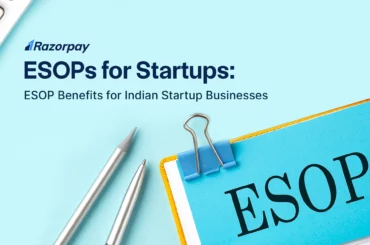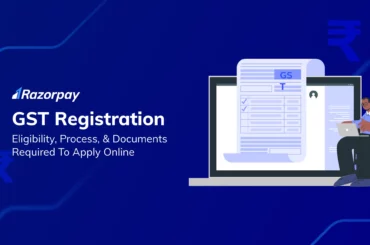COVID-19 has affected the daily life of every individual across the globe. While the country is slowly coming out of the lockdown, legal formalities cannot be prolonged more by businesses. MSME laws, new guidelines and a lot more are areas of major concern to a lot of Indian businesses.
The question of the hour is: How can businesses make sure that their legal formalities are in place right now. We invited Labdhi Kochar from Legalwiz to answer some of these questions for you.
Question: I am shutting my business down due to the pandemic. What are the legal formalities that I need to do in this case and how should I go about it?
Answer: Firstly, you need to hire an expert on board to check whether the compliance is fully done until now. The process of closure or dissolution of the company is not very complex given the fact that the compliance till date is taken care of and there are no debts and outstanding amounts in the financial statement.
There are many other requirements that need to be verified before filing for the closure of the business.
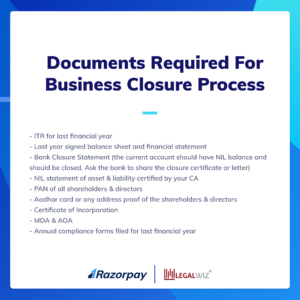
When we talk about Private Limited Company, an OPC or an LLP, the closure process is completely an online process with MCA wherein no physical presence of any director or shareholder is required. At the same time, if you wish to close the Partnership firm, an application for surrender of a PAN card needs to be filed along with dissolution deed properly executed with the Income Tax department as a part of proper process.
One can get in touch with various consultants, CA, CS or companies like LegalWiz.in who provide all such services PAN India level without taking much trouble.
Question: I want a NOC and NDA as soon as possible. How can I get it during the lockdown?
Answer: Here, I would first clarify what a NOC and NDA mean and what is the purpose of these documents. NOC i.e. No Objection Certificate is a legal document issued by any agency, organization, and institute or, in certain cases, an individual. It signifies that the party does not object to the covenants of the document. Whereas, an NDA i.e. Non- Disclosure Agreement is an agreement for establishing a confidential relationship between the parties as the parties signing it are obligated to not disclose the sensitive information shared amongst them to any third party.
There are various online legal services providers whom you can contact during the lockdown. If you know a lawyer then you can contact him too. You can also get in touch with LegalWiz.in Private Limited for the same as the company provides online legal drafting services.
For the execution of the same, you need to pay stamp duty for that you can go to a bank for franking or buy stamp paper online.
You can easily verify any business using a GST Verification Tool and minimize cases of fraud or any wrongdoings in the name of your business entity.
Question: Are we liable to pay rent even if we aren’t utilizing the space? Is there any legal way out?
Answer: It depends upon the Rent Agreement, please look for Force Majeure clause as it can help you to waive off your liability towards the landlord. In simple terms, ‘Force Majeure’ events relieve a party from performance of its contractual obligations, without any consequential breach of the contract, provided such performance is adversely impacted by events outside the control of an affected party such as an act of God, natural disaster, war, strike, lockout, epidemic, Government orders, etc. In the absence of the Force Majeure clause, you need to contact the landlord and request them to waive off the rent as legally there is no other way for you.
Question: What if we fail to fulfil our obligations towards a signed contract?
Answer: If you fail to fulfil your obligations under a signed legally valid contract then the other party might take action against you for recovery of damages due to breach of contract. In case you couldn’t perform the obligations due to unreasonable circumstances then you should discuss it with the other party as you might come out with a solution amicably. If that is not the case then you should read the contract properly and try finding loopholes under the same.
Question: Is it legal to terminate employment with an immediate effect?
Answer: It depends upon your employment agreement. Please see if your employment agreement has a clause for the immediate termination of the employee. Generally, employers always insert immediate termination clauses in the employment agreement. Then you need to check the reasons cited for immediate termination and have you triggered any of them. In the worst-case scenario, you can request your employer to provide you with some notice period so that you can find another job meanwhile.
Question: What are the benefits available under startup & MSME specific schemes?
 There is a recent change in the eligibility criteria under MSME laws:
There is a recent change in the eligibility criteria under MSME laws:
| Type of Enterprise | Investment | Turnover |
| Micro | Rs. 1 Crore | Rs. 5 crore |
| Small | Rs. 10 Crore | Rs. 50 Crore |
| Medium | Rs. 50 Crore | Rs. 250 Crore |
Here are a few listed major benefits offered by the Government of India to the MSME sector:
- Registered MSME business gets a special benefit for the recovery of the pending amount in case the buyer does not pay on time after the supply of goods or services on time. The credit period is for 45 days if there is no mention of due date for payment and in case the buyer fails to make the payment during the period, compound interest is charged at 3 times the rate notified by RBI.
- Subsidized bank loans at low interest.
- Benefits in the form of rebates and concessions specifically given to the registered MSME enterprises under Income Tax Act and GST.
- Easy access to credit. Credit rating also plays an important role here.
- Rebate in government fees on filing Trademark and Patent applications.
- Support from Central and State Government in various aspects.
- Government driven benefits are like: collateral free borrowing, technology up-gradation support, energy conservative support, set up of business incubators, credit rating support etc.
During a pandemic, the government has announced several benefits and financial aid to these sectors. Contact your consultant to know more or connect with LegalWiz.in to understand the benefits and applicability of MSME, MSME laws and Start-Up India Schemes.
Question: What are the benefits to MSMEs in the recent announcements made for COVID crisis?
Answer: The MSME sector is currently one of the hardest hits due to the lock-down of COVID-19. This sector contributes almost 30% of India’s GDP and also provides 114 million people with jobs. Most MSMEs could not pay their employees’ salaries because of the on-going lockdown. The government has therefore announced certain major reliefs in order to reduce the difficulties faced by these companies.
On 13 May 2020, the Finance Minister announced the first tranche of the stimulus package Rs.20 lakh crore. The main focus was to raise and support the country’s MSME sector. Dramatic steps to help MSME survive in this CoVID-19 situation have been announced.
Here are the major six announcements made for MSME:
Collateral Free Loans for MSME
This loan shall be given for a tenure of 4 years with a moratorium of 12 months along with a 100% credit guarantee. Borrowers with upto Rs 25 crore outstanding and Rs 100 crore turnover are eligible. This scheme shall be availed till 31st October 2020.
Debt Provision for Stressed or NPA MSME
Subordinated debt provision of Rs.20,000 crore has been announced for stressed or NPA MSMEs hereby benefitting nearly 2 lakh MSMEs.
Creation of Corpus Fund
Infusion of Rs.50,000 crore equity has been done for MSMEs having the potential to grow. Support for expansion in capacity and getting listed in markets shall be provided through the corpus of Rs.10,000 crore- Mother fund and Daughter Fund.
Definition of MSME revised with Additional Criteria and Increased Limit
Apart from the addition of new criteria and increased investment limit,the differentiation between manufacturing and service MSMEs has been removed. Here is the revised definition of MSME:
| Type of Enterprise | Investment | Turnover |
| Micro | Rs. 1 Crore | Rs. 5 crore |
| Small | Rs. 10 Crore | Rs. 50 Crore |
| Medium | Rs. 50 Crore | Rs. 250 Crore |
Global tenders disallowed for Government contracts upto Rs. 200 crore.
Payments due to MSMEs to be cleared soon
All the PSUs and the Government of India shall clear the receivables due to MSMEs within next 45 days. Owing to non-participation in trade fairs due to COVID-19 e-market linkages shall be provided.
In these tough times, all these announced steps would serve as a major source of MSME survival. It also involves an increased investment limit to classify MSMEs and other steps as mentioned above will assist MSME in its daily operations, and may also act as a catalyst for their expansion schemes.
Question: I am stuck in a different state and my lease expires soon. What should I do? How can I renew my rental agreement?
Answer: If you want to renew the lease then you should contact the landlord and hire a lawyer to draft a renewal agreement for you in absence of a renewal clause in the present lease deed. If you already have a renewal clause in the present lease deed then you may proceed accordingly. In case you are getting a fresh lease deed, please make sure that you have a detailed Force Majeure clause in the deed covering natural calamity, pandemics, epidemics, fire, strikes etc. so that in case such events obstruct your performance under the deed, you can claim waiver of rent.
Further, execution of the same can be done by paying relevant stamp duty which can be paid through franking usually done at banks or buying stamp paper online, further attaching the same with the lease deed and attestation of the deed can be done through a public notary. You can find the stamp duty rates in the concerned state’s stamp act.
To renew your agreement:
Assuming the fact that the landlord is equally interested in renewing the rent agreement, you should first look for a renewal clause in the present rent agreement. If your rent agreement has a renewal clause then you could do it accordingly or in absence of the same, you can get a renewal agreement drafted by a lawyer. In case you are getting a fresh renewal agreement/rent agreement, please make sure that you have a detailed Force Majeure clause in the agreement covering natural calamity, pandemics, epidemics, fire, strikes etc. so that in case such events obstruct your performance under the agreement, you can claim waiver of rent.
For the execution of the rental agreement, you need to pay stamp duty which can be paid through franking usually done at banks or buying stamp paper online, further attaching the same with the rent agreement and attestation of the agreement can be done through a public notary. You can find the stamp duty rates in the concerned state’s stamp act.
Question: I want to register my business and get a PAN card. How should I do this given the pandemic situation?
Answer: All you need is to tell the expert (CA, CS or any consultant company) your requirement to register the business. Looking at the requirement the expert can advise you to register the business under Sole Proprietorship, Partnership, Limited Liability Partnership or a Private Limited Company. Every type of entity has different requirements. However, incorporation or registration of all is very simple if you have the correct person to guide you.
Below mentioned are the documents (common) which are required for any type of business registration:
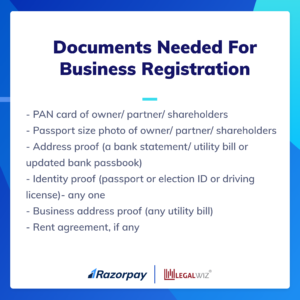 The process and timeline for registering the business as Sole Proprietorship, Partnership, Limited Liability Partnership or a Private Limited Company is very different however it can be easily managed by professionals.
The process and timeline for registering the business as Sole Proprietorship, Partnership, Limited Liability Partnership or a Private Limited Company is very different however it can be easily managed by professionals.
Your only task is to understand your requirements and select which type of entity you would like to register for your business and rest can be taken care of by the professional you are hiring.
Question: What documents do I need to register my company with the government of India?
Answer: Registration of Private Limited Company is very easy now in our country. The complete online filing process made the work so easy for both entrepreneurs as well as the professionals. One should require appointing a CA/ CS or ICWA for Incorporation of the Private Limited Company. There are a minimum of 2 directors and shareholders required for the formation. As the Company is treated as a separate legal entity, there is a requirement of a Registered Office of the company.
As the registration process is 100% online, the documents are also required in the scanned copy (legible). Here is the list of documents required for registration of Private Limited Company:
For Director & Shareholder:-
1) Passport Size Photographs
2) Self Attested copy of Pan Card
3) Self Attested copy of ID Proof – Driving License/ Voter’s ID/ Passport copy – any one
4) Self Attested copy of Address Proof – Bank Statement/ Telephone Bill/ Mobile Bill/ Electricity Bill (Latest Month)
For Registered office:
1) Business address proof (electricity bill/ telephone bill/ water bill/ gas bill) should not be older than two months and
2) No Objection Certificate from the owner of the property
3) Rent Agreement, if any
Formation of the company takes 10-12 working days subject to MCA approvals.
Question: I am planning to start an NGO. What all documents do I need?
Answer: There are 3 types of NGO types in India i.e. Trust, Society and Section 8 Company. All these are formed with the main object or intent of social welfare and development. These forms of Not-for-profit Organizations are very different.
Let’s talk about 3 types of NGOs in brief:
1. Trust: Under Indian Trusts Act, 1882 a trust gets registered through an agreement between the parties wherein one party holds the ownership of the property for the benefit of the other party. Trust has to be registered with the Deputy Registrar of the relevant area where one is forming a trust. There are a minimum of 2 Parties required to form a Trust.
The important document in this form of NPO is TRUST DEED. The legal rights are vested in the hands of the trustee of the property.
2. Society: A society is registered under the Societies Registration Act, 1860 with a minimum of 7 members through Deputy Registrar of Societies of the state. Generally, a society is registered with specific objects like literary, scientific or with a charitable purpose. Legal rights remain under the title of society. Formation of Society is a little expensive as compared to the formation of trust.
3. Section-8 Company: Section-8 Company is registered under the Companies Act, 2013. Formation of section-8 Company requires a minimum of 2 directors and shareholders. It is formed with commercial, social, charitable or any such other objective in which it intends to apply its profit for promoting such objectives. Memorandum of Association and Articles of Association are the two main documents or charters of the Company. This type of NGO brings more transparency in working as compliance is very similar than that to Private Limited Company.
The common documents required in formation of any of the above type of NGO are:
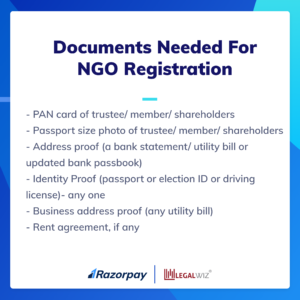 Question: Due to COVID-19, there are changes in the due dates for filing GST returns. I would like to know the newly extended dates?
Question: Due to COVID-19, there are changes in the due dates for filing GST returns. I would like to know the newly extended dates?
Answer: Once your business is registered under the GST, it is mandatory to file returns either on a monthly basis or quarterly basis depending on turnover. However, this option is available only in case of GSTR-1. For GSTR-3B, it has to be filed for every month by 20th of the next month irrespective of the turnover. However, under the COVID-19 situation the due dates for the returns due in the month of March, April and May have been extended based on the turnover.
| Particulars | Filing Period | Due Date Before COVID-19 | Due Date during COVID-19 |
| For businesses having turnover more than Rs.5 Crores during the previous financial year | GSTR-3B for March till May | 20th of Next Month | 24th June |
| For businesses having turnover up to Rs.5 Crores during the previous financial year | GSTR-3B for March till May | 20th of Next Month | 30th June |
| For all the businesses | GSTR-1 for March till May | 11th of the Next Month (monthly basis)/11th of the Next month after the quarter (Quarterly Return) | 30th June |
If you’re wondering how much GST you must pay for your goods or services, simply use an online GST calculator.
Question: What are the changes in ITR filing and other filing dates?
Answer: Generally every person as defined under the Income Tax Act 1961 is required to file Income Tax Return for every financial year. There are different due dates applicable to each person based on their turnover. However, owing to the COVID-19 shutdown the due dates have been extended for the ease of filing.
| Particulars | Due Date before COVID-19 | Due Date during COVID-19 |
| Individual
Partnership Firms and LLPs not requiring Audit |
31st July | 30th November |
| Companies
Partnership Firms requiring Audit |
31st October | 30th November |
Also, the due date for tax audit has been extended to 31st October instead of 30th September. The last date for filing Income Tax Return for FY 2018-19 has also been extended to 30th June 2020.
If you have any more questions, please write them in the comment section below and we will answer them at our earliest.


